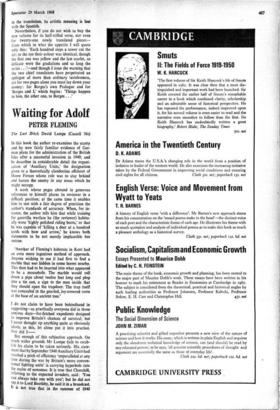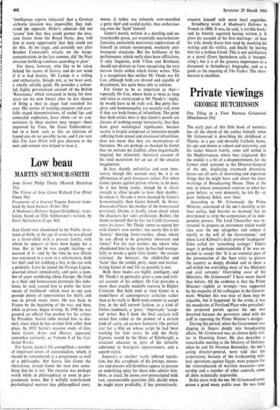Waiting for Adolf
PETER FLEMING
The Last Ditch David Lampe (Cassell 36s) In this book the author re-examines the scanty and by now fairly familiar evidence of Get- man plans for the administration of the British Isles after a successful invasion in 1940; and he describes in considerable detail the organi- sation of 'Auxiliary Units,' the designation given to a theoretically clandestine offshoot of Home Forces whose role was to stay behind and harass the enemy in any areas which he might occupy.
A work whose pages abound in generous references to himself places its reviewer in a difficult position; at the same time it enables him to test with a fair degree of precision the author's standards of accuracy. When, for in- stance, the author tells him that while training for guerrilla warfare he (the reviewer) habitu- ally wore 'highly polished riding boots,' or that he was capable of 'killing a deer at a hundred yards with bow and arrow,' he knows both statements to be not merely implausible but untrue.
'Another of Fleming's hideouts in Kent had an even more ingenious method of approach. Anyone wishing to use it had first to find a marble that was hidden in some leaves nearby. This then had to be inserted into what appeared to be a mousehole. The marble would roll down a pipe about twelve feet long and plop into a tin can, a sign to the men inside that they should open the trapdoor. The trap itself was concealed in the gnarled, ivy-covered roots at the base of an ancient tree.'
I do not claim to have been behindhand in suggesting—as practically everyone did in those anxious days—far-fetched expedients designed to improve Britain's chances of survival; but I never thought up anything quite as obviously idiotic as this, let alone put it into practice. Nor did I—
But enough of this subjective approach. On much wider grounds Mr Lampe fails to estab- lish his claim to be taken seriously. His state- ment that by September 1940 Auxiliary Units had reached a pitch of efficiency 'unparalleled at any time during the war by Britain's more conven- tional fighting units' is carrying hyperbole into the realm of nonsense. It is true that Churchill, referring to the expected invaders, said: 'You can always take one with you'; but he did not say it to Lord Boothby, he said it in a broadcast_ I1 is not true that in the summer of 1940 'intelligence reports indicated' that a German airborne invasion was impossible; they indi- cated the opposite. Hitler's admirals did not 'assure' him that they could protect the inva- sion forces from the Royal Navy; they told him at every opportunity that they could not do this. At no stage, and certainly not after Bomber Command's attacks on the barge- concentrations in the late summer, did 'the Nazi invasion build-up continue according to plan.'
For those, however, who like to be taken behind the scenes of history and do not mind if it is bad history, Mr Lampe is a willing and enthusiastic, though not, as we have seen, a wholly reliable guide. He provides a colour- ful, highly personalised account of the British 'Resistance,' which remained in being for four years (as we now know) after its last chance of firing a shot in anger had vanished for ever. His stories of training exercises and care- fully staged demonstrations, of sealed lips and concealed explosives, have often—or so con- noisseurs in these matters may suspect—been improved by Time, the Great Embroiderer; but to a book such as this an infusion of legend can do no possible harm, and I am sure that The Last Ditch will give pleasure to the men and women who helped to man it.







































 Previous page
Previous page